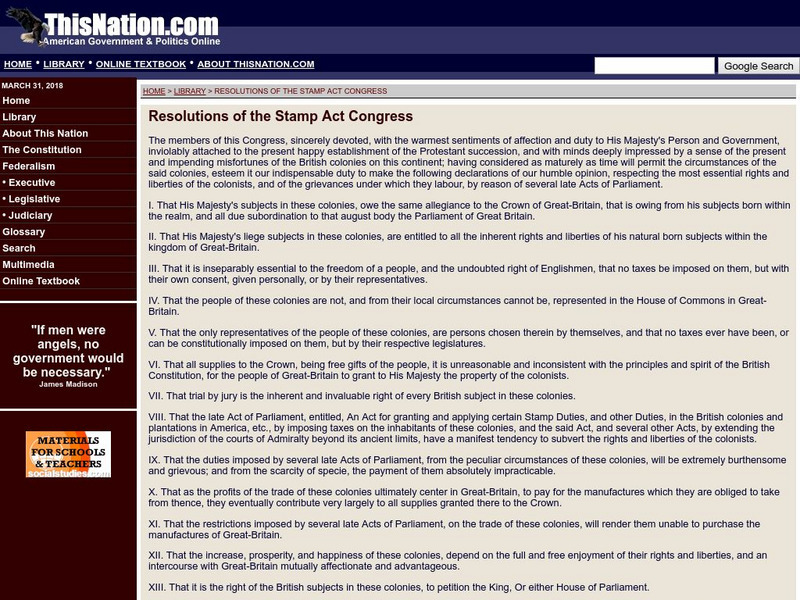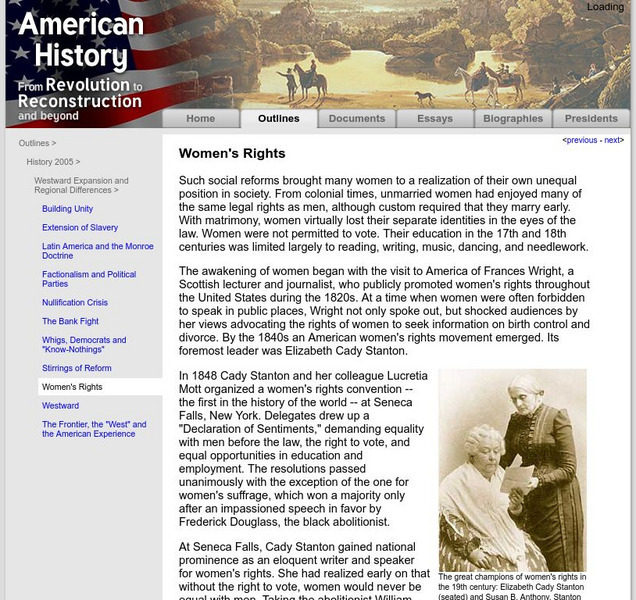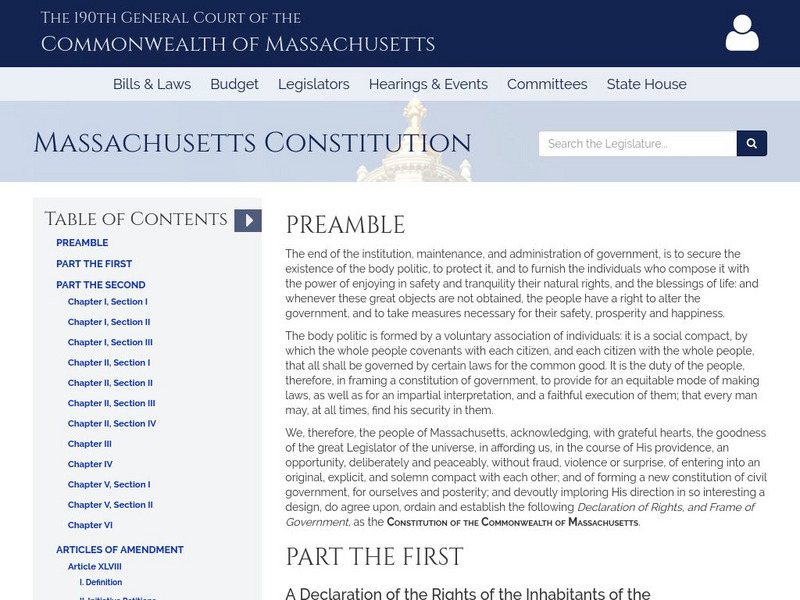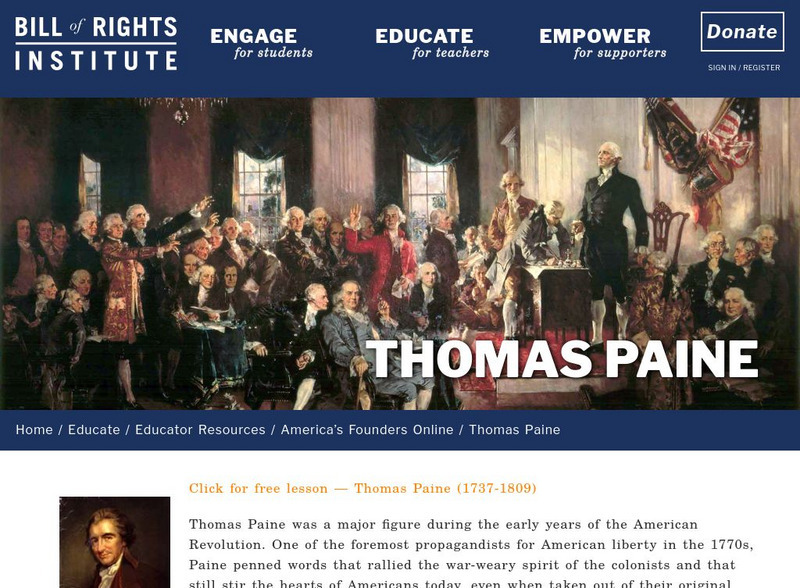Hi, what do you want to do?
This Nation
This nation.com: Resolutions of the Stamp Act Congress
This site provides the full text of the resolutions of the Stamp Act Congress.
Digital History
Digital History: The Emergence of New Ideas About Personal Liberties
American colonists expected to have "English rights" as supported by the Magna Carta and the English Bill of Rights. See how these rights were applied in the trial of John Peter Zenger, whose acquittal reflected the right of freedom of...
Independence Hall Association
U.s. History: Beginnings of Revolutionary Thinking: Trial of John Peter Zenger
Freedom of the press? That was not always an accepted right. Read about the trial of John Peter Zenger, who was accused of libel for printing truths about the royal governor of New York. Find out the outcome of the trial and what it...
Other
Liberty Online: A Summary View of the Rights of British America
Written before the Declaration of Independence, this lengthy essay by Thomas Jefferson argued that the British Government was treating America unfairly. This site contains full text and footnotes within text hyperlinked to panel at...
University of Groningen
American History: Documents: Pitt on the Stamp Act
The original text of British Prime Minister William Pitt's actual speech to Parliament describing his disapproval of the Stamp Act and why he felt it should be repealed.
University of Groningen
American History: Outlines: A New Colonial System
Overview of the development of a strengthening identity within the colonies and the number of Acts imposed by the British Parliament intended to exercise central control over the colonies.
University of Groningen
American History: Outlines: Women's Rights
Such social reforms brought many women to a realization of their own unequal position in society. From colonial times, unmarried women had enjoyed many of the same legal rights as men, although custom required that they marry early. With...
Other
Commonwealth of Massachusetts: The Declaration of Rights
Read the original, A Declaration of Rights of the Inhabitants of the Commonwealth of Massachusetts, including Articles I through XXX, complete with all parts of the adopted constitution and its amendments for governing colonial...
Bill of Rights Institute
Bill of Rights Institute: Thomas Paine
Thomas Paine was a major figure during the early years of the American Revolution. One of the foremost propagandists for American liberty in the 1770s, Paine penned words that rallied the war-weary spirit of the colonists and that still...
University of Virginia
University of Virginia: A View of the Rights of British America
Before writing the Declaration of Independence, Thomas Jefferson made his views known through "A Summary View of the Rights of British America" and other essays. This essay discusses the historical roots of independence and inalienable...
CPALMS
Florida State University Cpalms: Florida Students: Colonists: What Were They Thinking?
This tutorial looks at the British political traditions that influenced the American colonists as they gained their independence from Britain and created their own form of government. A PDF file of the tutorial is available.
Digital History
Digital History: The Boston Massacre [Pdf]
This excellent recounting of the days that led up the Boston Massacre and the massacre itself fills in a lot of information that is lacking in textbooks because of space contraints. Read about the British soldiers' and the colonists'...
Bill of Rights Institute
Bill of Rights Institute: James Otis
James Otis was called the most important American of the 1760s by John Adams. A trained lawyer and master of argument, James Otis was a leader of the Patriot movement in Boston in those years. Initially a prosecutor for the British...
Digital History
Digital History: The Age of Constitution Writing [Pdf]
See how colonial and state constitutions differed and how the idea of a social contract between a government and its citizens is reflected in the state constitutions. The second half of this site gives an abbreviated text of the Articles...
Digital History
Digital History: By What Right [Pdf]
Two opposing philosophies concerning the relationship between government and its citizens were expressed by Thomas Hobbes and John Locke in the 17th century. Compare these two philosophies and see how they were related to the colonists'...
National Endowment for the Humanities
Neh: Edsit Ement: Boycotting Baubles of Britain
A great lesson plan that examines the role consumer boycotts of British goods in colonial America had in the run-up to the Revolutionary War. Find learning objectives, instructional activity activities, and assessment options.
BBC
Bbc: Week of 12 16 13: Why India's Gay Community Is in Shock
Recently, the goverment of India shocked its LGBT population by deciding to enforce a colonial-era law that forbids same sex relationships. Learn why so many Indians view this as a devastating step backwards in the battle for human rights.
University of Groningen
American History: Outlines: The Coercive Acts
Overview of the series of restrictive and punitive measures imposed by British Parliament on the colonists in response to the Boston Tea Party.
ClassFlow
Class Flow: Causes of the American Revolution
[Free Registration/Login Required] This interactive flipchart includes activities incorporating art to teach causes of the American Revolution. It is based on the Houghton Mifflin series.
C3 Teachers
C3 Teachers: Inquiries: American Revolution
A learning module on the American Revolution that includes three supporting questions accompanied by formative tasks and source materials, followed by a summative performance task. Students investigate the question of whether the...
iCivics
I Civics: Colonial Influences
Where did the American colonists get their ideas that lead to a revolution and a whole new kind of government? This lesson explores the Magna Carta, Mayflower Compact, English Bill of Rights, Cato's Letters, and Common Sense.
National Women’s History Museum
National Women's History Museum: Anne Hutchinson: American Women's Movement
This instructional activity focuses on the life and trials of Anne Hutchinson, who fought for the rights of women in mid-17th century New England.
Colonial Williamsburg Foundation
Colonial Williamsburg: Richard Henry Lee
This is a brief, chronological history of the important events in the life of Richard Henry Lee. Provides good information and links.
Independence Hall Association
U.s. History: Committees of Correspondence
See how organization can be a stepping stone to freedom. Read about the actions and the reasons behind those actions of the Committees of Correspondence prior to the Revolutionary War.






















